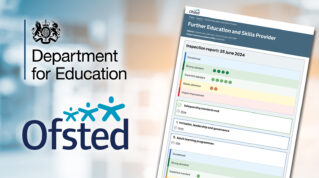Ofsted has committed to enlisting “at least” one inspector with “specific” sector experience in “most” of its inspection teams from November.
Today’s announcement on inspection team structures will come into effect when the watchdog’s proposed inspections overhaul is rolled out later this year.
The revamp comes after Ofsted heard during its Big Listen consultation that its inspectors do not always have the necessary expertise of particular types of provision, such as special schools or apprenticeship providers.
The watchdog said it will “make the best use” of Ofsted inspectors’ (OIs) current sector knowledge to deploy them onto visits of providers that match their expertise to “specific” types of provision.
Chief inspector Sir Martyn Oliver said: “All inspection teams will have the right blend of inspection expertise and current sector insight.
“This will help us better understand the context of the schools and colleges we inspect, to provide a fair and accurate report for parents”.
Oliver also announced that inspectors employed as His Majesty’s Inspectors (HMIs) will only be able to lead visits from November in a bid to “draw on expertise” and keep “consistency” across the country.
This means only HMIs, or contracted Ofsted inspectors (OIs) with HMI experience, will lead inspection teams.
An Ofsted spokesperson said around two-thirds to three-quarters of all inspections are currently led by HMIs.
Inspections led by OIs with recent HMI experience (currently within the last three years) will be decided on a case-by-case basis.
“We want to make sure our inspections are as consistent as possible, from Cornwall to Northumberland,” Oliver said.
He added: “We have already put stronger quality assurance measures in place, and utilising the expertise of our workforce as effectively as we can is another significant step forward.”
Oliver encouraged delegates at the Association of Employment and Learning Providers (AELP) conference this week to join Ofsted as an inspector.
An Ofsted spokesperson told FE Week that it currently had around 2,000 people registered as interested in becoming an OI.
Oliver said at the conference: “You can help us even more by contributing your skills and becoming an Ofsted inspector. The more of you that join, the better I can build a peer-led inspectorate, and I better can match inspector expertise to the providers out there. So get involved. Please be part of the system.”
Leadership unions this week warned they will ask their members to quit as inspectors if Ofsted did not delay the rollout of new inspections until September 2026.















So for a national provider of hospitality or hairdressing apprenticeships Ofsted will commit to one specialist inspector on the team. That will really give providers confidence in Ofsted knowing how good the knowledge, skills and behaviours are of a thousand apprentices. Of course it might be easier to have expertise with secondary education for a school
So, any national provider might say: “thank you OFSTED, and I hope it’s not causing too much trouble for you to find someone who actually knows what their looking at with a relevant background. We know you must have been trying previously very hard, so please don’t feel that you now need to apologise”. Colleges and providers graded inappropriately “good or outstanding” won’t mind at all! Other providers such as those graded “inadequate” thanks to your actions, will no longer be around to complain! Finally, just a word of caution in going forward when looking for individuals who have a good relevant background and experience in the occupational sector, and also of workplace delivery of competency based qualifications. Ask yourself why if they are any good, would they want to be an OFSTED inspector! That must be a very rare person who is currently working with an independent training provider.
The reason to work for an inspectorate part-time is to get the opportunity to see what others ate doing first hand and to adopt good practice where you work. It served me well in getting outstanding grades with the FEFC. Ofsted however would have been a less attractive proposition if I was in my 20s or 30s today as their attitude is not appropriate except for some individual inspectors who treat those being inspected well.
One point that will emerge is the use of the word majority – it means over 50%.